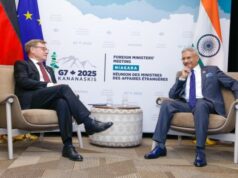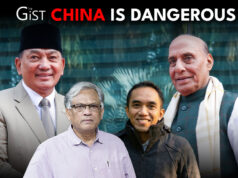Former foreign secretary of Bangladesh Shamsher M. Chowdhury says he is shocked and appalled by the kind of disinformation being put out by the Indian media over the events in Bangladesh.
Even media houses known for their fairness and balanced views have become ‘totally radicalised”, and “they don’t want to see anything good about Bangladesh,” he said.
People seem to forget that Bangladesh was born through a violent war for independence in 1971, he said. “India witnessed this from outside as a neighbour, and then got directly involved and fought shoulder to shoulder and sacrificed lives for Bangladesh.”
The war against the West Pakistan establishment began with the language movement, which began in the early 1950s, and “we have shed blood for our language,” said Chowdhury, who served in the Pakistani army before joining the war for independence.
“We shed blood in 1952, 1969 and much more blood in 1971, and we shed blood even this time,” he said. “But the saddest thing about this time was that the bloodshed was initiated “by our own government, our own police, our own people,” he said, citing horrific examples of extreme state brutality against the agitating students and protestors.
“Eventually, Prime Minister Sheikh Hasina had to run for her life, abandoning her entire political structure,” he said.
“Every action has an equal and opposite reaction,” and so when that kind of extreme brutality is unleashed on unarmed people who are protesting for something justifiable, you go to the other extreme reaction, he said.
The Jamaat, which has cadres and street power, did join the student movement, he said. But “are they the voice of Bangladesh? I am confident they are not…They are a part of Bangladesh’s political landscape, but they are not going to be taking the decisions,” he said, citing “visible signs of a split between the Jamaat and the BNP.”
“So, for Indian commentators to say that the whole thing is Pakistan’s ISI, American, etc,…don’t give the ISI so much credit, they can’t even get things right in their own country. For God’s sake, stop searching for the ISI behind every tree. You will not find them here”
“Yes right now, things have changed and Pakistanis have reason to be happy, but that is a very short-lived and limited thing. People like me are still alive, freedom fighters are still alive in Bangladesh,” he said.
As for the release of hardline Islamic fundamentalists with links to terror outfits like the ISIS and the Al Qaeda by the caretaker government, he said it was a cause for concern, and he was trying to understand the reasons for their release.
Condemning the attacks on Hindus and their crematoriums and places of worship, he said Prof Mohammad Yunus, who now heads the caretaker government, had made it very clear that such acts would not be tolerated.
Prof Yunus, “is inherently a non-communal person,” he said, noting that his Grameen Bank program was targeted at rural women, and “a huge percentage of them are non-Muslims.”
“The very first call Prof Yunus made to a foreign leader after being sworn in as the chief adviser to the interim government was to the Prime Minister of India, Narendra Modi,” said Chowdhury.
“And Mr Modi was the first foreign leader to send his goodwill to prof Yunus. He did mention the protection of minorities, which is from his political standpoint natural to expect. He also invited Prof Yunus to a virtual meeting the next day with other leaders from South Asia and beyond, which gave Yunus some exposure.
And then the Indian high commissioner here met the finance minister last week to discuss lines of credit. These are positive initiatives that came from the Indian establishment, he said.
Admitting that there has been an anti-India sentiment in Bangladesh even before the recent developments, he said there still are “fissures here and there, which we need to work on.”
As for Bangladesh, “Look at these allegations of corruption (by the Hasina regime) that are coming out. even in the military, which once enjoyed wide respect among the people, in general,” he said.
“It has taken us 15 years to reach this level of rot,” so you can’t fix things overnight. Six commissions have been set up to consider massive reforms across the board, including government institutions and systems, and “it will take time,” he argued.
Arguing that secularism is an ideal, which can be misinterpreted as being against religion, he said a more correct phrase would be to say “we are non-communalist society, which we have always been. So let us look for a non-communal, truly democratic Bangladesh.”
So what happens next? When will elections be held? Will the students who spearheaded the protest movement find a place in the new elected government? Will the political reforms involve a new system of governance in the country? Will the domestic resentment against India continue to fester?
To understand what a veteran Bangladeshi freedom fighter and leader thinks about the future of his country, watch the full interview.
In a career spanning three decades and counting, Ramananda (Ram to his friends) has been the foreign editor of The Telegraph, Outlook Magazine and the New Indian Express. He helped set up rediff.com’s editorial operations in San Jose and New York, helmed sify.com, and was the founder editor of India.com.
His work has featured in national and international publications like the Al Jazeera Centre for Studies, Global Times and Ashahi Shimbun. But his one constant over all these years, he says, has been the attempt to understand rising India’s place in the world.
He can rustle up a mean salad, his oil-less pepper chicken is to die for, and all it takes is some beer and rhythm and blues to rock his soul.
Talk to him about foreign and strategic affairs, media, South Asia, China, and of course India.




